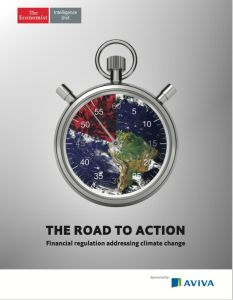Join getAbstract to access the summary!

Join getAbstract to access the summary!
Economist Intelligence Unit
The Road to Action
Financial Regulation Addressing Climate Change
EIU, 2017
What's inside?
All stakeholders must define and report the financial risks associated with climate change.
Recommendation
Climate change poses dire threats to the environment and thus serious danger to the global financial system. International financial institutions, with their enormous clout in lending and development funding, are in a unique position to help drive carbon-reduction goals. But many financial services providers have yet to incorporate climate change into their risk models or their standard reporting and disclosure statements. getAbstract recommends this thought-provoking study from the Economist Intelligence Unit, which makes a convincing point that underscoring climate change’s financial impact on businesses and investors is a crucial part of tackling the problem.
Summary
About the Author
The Economist Intelligence Unit is an independent research and analysis organization.

























Comment on this summary